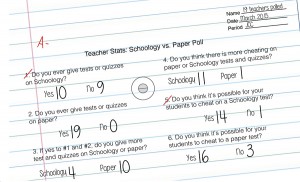OPINION: Ban Schoology tests
May 10, 2015
Looking over your classmate’s shoulder, writing notes on your hand, and keeping notes under your desk are outdated. The new way to cheat in Shalhevet is far more doable, and thus more dangerous to both students and teachers: Schoology cheating.
In a new poll conducted by Features Editor Rose Lipner, more than twice as many students said they had cheated on Schoology tests as on paper — even though fewer tests are given on Schoology, according to a separate poll of teachers. That suggests that a very high percentage of Schoology tests are being compromised, one way or another.
Why? Because it’s so easy. A teacher standing in the front of the room can’t see what’s happening on iPad screens. On iPads, students can switch between apps without abandoning their exam; on a laptop, they can have multiple windows open at once. Windows with class notes, web pages, even text messages and Facebook chats.
And then there are screen shots. With just two fingers, a page can be copied to be sent later on to students who have not yet taken the test. The poll showed this was the most common type of cheating in school.
There is a very simple solution to this problem: Shalhevet should ban Schoology tests. This would eliminate the possibility of computer cheating and take students back to something not that ancient: taking tests with pencil on paper.
We understand why teachers want to give tests by computer. Schoology instantly grades most questions and provides a report to the teachers on which questions the most students got right and got wrong. Once graded, they are automatically entered into the Schoology gradebooks used for report cards.
For students, Schoology tests make it easier to quickly type longer answers to essay questions.
But this all goes to waste if teachers don’t have accurate assessments of students’ abilities, not knowing who actually deserves his or her grade, and if students don’t really study because they know that exactly what question will be asked.
Some say it’s the responsibility of the students to be honest. If they choose to cheat, they just won’t benefit as much from the class in the long run. Others argue that because cheating is so prevalent, banning online tests will not help. After all, students still cheat on paper, too.
And both Reb Noam and incoming General Studies Principal Daniel Weslow suggested that rather than banning Schoology tests, the school should investigate why so many students are cheating.
But while we would hope most students have the moral fiber not to cheat, some are too lured by the temptation. In fact, more commonly, they don’t consider a class serious enough to study for if they have the option of cheating on the next exam.
Cheating is a habit that can continue into adulthood. Giving tests on Schoology increases temptation and thus increases cheating. We are often told that the best way to avoid a bad habit is not to start. Preventing cheating – at least for some students – is clearly within our school’s reach.
A ban on Schoology tests would be easy to enforce, would work instantly, and would let us keep everything that is good about Schoology, from homework listings and group messages to Rami Gruman’s provocations in Student Activities posts. All we have to lose is the temptation to do something really wrong.
So ban Schoology tests. It’s an answer that you don’t need to cheat to find.














RSP • Nov 26, 2017 at 5:44 am
Seems to be done.
https://support.schoology.com/hc/en-us/articles/216767037-Respondus-LockDown-Browser-Administrator-Guide
ed • Jan 16, 2016 at 3:36 am
Um yea. That was a year ago. Still waiting . . .
Jen Marie Robustelli • May 11, 2015 at 9:12 am
Hello!
We take feedback from our users seriously here at Schoology, and I just wanted to update with a comment that we’re currently developing a way for teachers to lock browsers when students are taking a test or quiz in Schoology, as announced in our blog here: https://www.schoology.com/group/25228991/blog/post/228892330
“Respondus Lockdown Browser Integration
Instructors will be able to give students tests and quizzes in Schoology via the Respondus Lockdown Browser. This browser prevents students from opening new browser windows and applications during tests, quizzes, and other assessments.”
Thanks for writing about this issue!
-Jen, Marketing Communications Director at Schoology